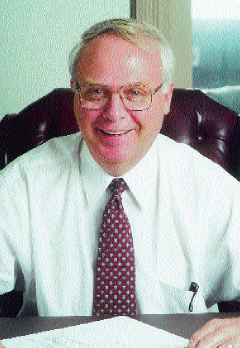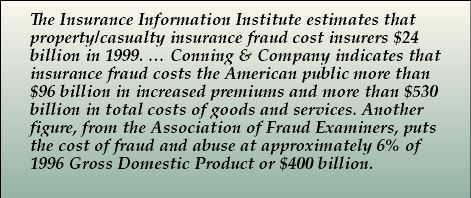

President and CEO Robert M. Bryant came to the National Insurance Crime Bureau after having served with the FBI for more than 31 years.
The list of growth industries has varied over the years, featuring such areas as railroads, automobiles, steels, electronics, discount stores, television and, in recent years, biotech, Internet, BtoB, and e-commerce. The common denominator for virtually all of them is that at some point in time, they ran out of steam. Sales and earnings declined, public interest waned and they were replaced by the next generation of growth stocks. There's one industry, however, that hasn't run out of steam, hasn't fallen out of favor and continues to show sustained growth year after year after year. Unfortunately honest people can't participate in this growth area--without getting into trouble.
The economic sector with this virtually unbroken string of revenue growth is insurance fraud.
So, while those trying to defraud insurance companies have shown remarkable staying power, creating innovative ways of attempting to get something for nothing, there are growing indications that the noose is starting to tighten and insurers are getting more and more sophisticated when it comes to combating fraud. What's even more important is that legislatures are realizing that fraud is immensely costly and no longer can be treated as a victimless crime.
It is difficult to determine just how costly fraud is because various organizations offer different figures in their annual compilations or in special studies. The Insurance Information Institute estimates that property/casualty insurance fraud cost insurers $24 billion in 1999. A recent special study from Conning & Company indicates that insurance fraud costs the American public more than $96 billion in increased premiums and more than $530 billion in total costs of goods and services. Another figure, from the Association of Fraud Examiners, puts the cost of fraud and abuse at approximately 6% of 1996 Gross Domestic Product or $400 billion. But no matter which number is used, there is no doubt that fraud is costly and presents a drain on the nation's economy.
Battle lines are drawn
As the toll of fraud escalates, more and more groups are joining the battle. Among the leaders in the fight is the National Insurance Crime Bureau (NICB). Now entering its 90th year, the NICB was founded in 1912 as the National Auto Theft Bureau, some 15 years after the first automobile insurance policy was issued. Reorganized in 1992 as a not-for-profit organization, it is now supported by approximately 1,000 property/insurance companies and self-insured organizations. Included in the membership roster are Allstate Insurance Group, The Hartford Insurance Group, Kemper Insurance Cos., Liberty Mutual, Nationwide Group, Progressive Insurance Group, State Farm Group, TIG Holdings and USAA Group.
For 1999, NICB showed revenue of close to $30 million, had more than 300 employees, with national offices in Arlington, Virginia, and Chicago, Illinois, as well as field offices in Seattle, Chicago, Los Angeles, Dallas, Atlanta, New York, Columbus, Ohio, and Washington, D.C.
Overseeing this vast array of insurance fraud fighting efforts is Robert M. Bryant, president and chief executive officer. He was appointed to this position in October 1999, after more than 31 years with the Federal Bureau of Investigation. While there, he presided over the development of the Bureau's new strategic plan and reorganization that place additional emphasis on intelligence and technology. His career with the FBI culminated with his appointment as deputy director. Among his notable achievements were oversight of the Oklahoma City bombing investigation, the peaceful resolution of the Montana Freeman standoff, and the creation of the "Safe Streets Program," a partnership with local authorities that led to the creation of more than 170 anti-crime task forces throughout the country.
Economic implications of insurance fraud
In his new position, Bryant is able to make use of the skills and expertise he acquired with the FBI since he now works closely with insurance executives and law enforcement officials to detect, prevent and deter insurance-related fraud. Fraud, says the NICB, is the second most costly white-collar crime in American, trailing only tax evasion.

To put a pocketbook or wallet number on fraud, Bryant says it costs Americans at least $30 billion annually and adds between $200 and $300 to total insurance premiums for the average household.
Fraud, according to the NICB's top official, comes in many forms and often it is difficult to recognize. A roster includes life insurance fraud; disaster fraud, most often perpetrated by contractors following hurricanes, flooding, earthquakes or tornadoes; auto insurance fraud, especially stage accidents, which have soared 33% in the past two decades; workers compensation; health care and health insurance fraud, including Medicare and Medicaid claims; homeowners insurance fraud, and two fairly recent innovations, viatical and e-commerce fraud.
A people's crime
Not only is fraud carried out by organized crime rings, but entire families-- doctors, lawyers and just plain citizens, who don't think they are really doing anything wrong--are frequent participants. Bryant notes just one example: An April article in the Journal of the American Medical Association cites a survey that says 40% of doctors at least sometimes deceived insurance companies. "Although the majority recognized that this was unethical," he says, "they admitted that they exaggerated illnesses, changed diagnoses, and documented false symptoms."
But doctors, he adds, are no different from the rest of the nation's citizens. "A recent survey by the Insurance Research Council shows that 35% of Americans think it's all right to inflate their insurance claims," he says.
In order to reduce the economic toll of insurance fraud, the NICB is accelerating its efforts. "We have significantly strengthened our capabilities by adding sophisticated information systems, rich databases and criminal intelligence analysts," says Bryant. "These tools will penetrate the schemes of corrupt professionals and identify other insurance criminals with greater speed and precision than ever before. We call this "predictive knowledge"--and believe it will give insurers the investigative skills and technology necessary to stop fraud before it takes place."
The NICB employs a number of weapons in its fight against fraud. These include:
*The Investigative Services division, made up of 160 special agents, which works with insurance companies and law enforcement agencies to identify, investigate and prosecute insurance scam artists
* The Operations Support department which acts as the main support group to all other NICB activities, including the toll-free hotline, various property/casualty and workers compensation programs, and vehicle support activities
*The International Division which aids law enforcement agencies to interdict stolen vehicles before they are exported from the United States
In addition, NICB provides training programs to insurers and law enforcement agencies; maintains a Government Affairs department which works with state legislatures to introduce and strengthen anti-fraud and vehicle theft statutes, and a Public Affairs group that produces comprehensive publicity campaigns, public service materials, media relations efforts and maintains an interactive Web site (www.nicb.org).
"While all of our technology and knowledge will give our member companies, as well as the entire insurance industry, the tools to more effectively fight fraud," says Bryant, "too many people still find it acceptable to attempt to defraud their insurance company, or to tolerate that behavior among others. Unfortunately, the public is not as concerned as it should be about fraud and its consequences, and that is costing them money."
One example to heighten awareness is the joint effort with the CPCU Society and its more than 30,000 credentialed insurance professionals to educate consumers about possible fraudulent situations that exist. Noting in a brochure that "insurance cheats are deadbeats" and that insurance fraud, in any form, is a CRIME, NICB has provided a hotline at (800) TEL-NICB for consumers to report a suspected scam.
The Bureau has also made use of the recent movie "Gone in 60 Seconds," to increase public awareness of vehicle theft, with the creation of an educational brochure describing the scope of the problem--three cars stolen every minute--the insurance industry's response and what the public can do to avoid becoming a victim.
Misdemeanor to felony
Bryant indicates that one of NICB's major efforts in 2001 will be to work through state legislatures to toughen anti-fraud statutes even further. "Most states now classify fraud as a felony rather than as a misdemeanor. What we would like to see is the creation of heavier penalties for certain types of fraud, like staged auto accidents or organized medical mills. We would also like to see a stronger immunity statute which would allow insurance companies to work more closely with each other in sharing information."
The role of the agent will become more important in the anti-fraud effort as well. "I believe the agent is our first line of defense in combating fraud," Bryant says. "This includes knowing his or her clients and what's going on in the community, particularly in less than a large city, and reporting any suspicious activity or abnormal situation to the proper law enforcement agency and insurance company."
Bryant acknowledges that the task is a difficult one but believes that with all the groups working together--insurance agents and companies, law enforcement agencies, federal and state legislatures and, most important, the premium-paying public--insurance fraud can be turned into a no-growth industry. *
The author
Samuel Schiff is a New York-based freelance writer.